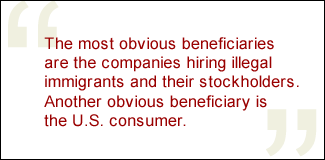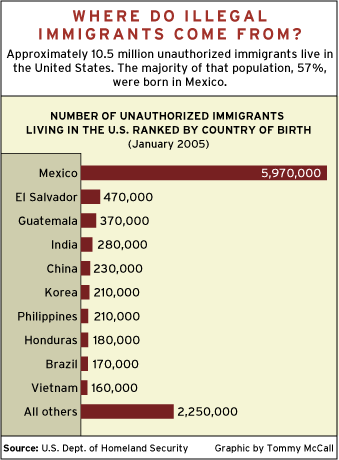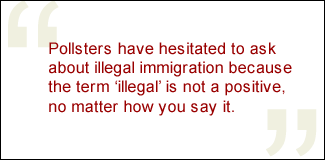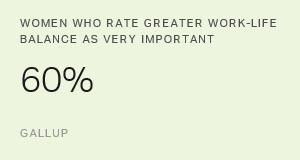There's an old joke about economists: If you laid all the world's economists, living or dead, end to end, they still wouldn't reach a conclusion. That joke hits very close to the bone on the illegal immigration question.
Some economists, and many business leaders, say that the American economy depends on illegal workers; they accept low wages for necessary jobs, pay taxes, and spend money, all of which expands the national economy. Other economists say that the influx of illegal workers costs the government in increased expenditures for Medicare, law enforcement, and education -- and in a hundred other ways -- and illegal workers don't pay enough in taxes to recompense what they cost.
 |
According to a Gallup Poll, 66% of Americans believe that illegal immigrants "cost the taxpayers too much by using government services like public education and medical services" rather than becoming "productive citizens" in the long run who "pay their fair share of taxes." But even more Americans -- 74% -- say that illegal immigrants mostly take low-paying jobs that Americans don't want. Can anyone reach a conclusion on this matter? (See "Hispanics, Whites, Blacks Not in Complete Agreement on Illegal Immigration" in the "See Also" area on this page.)
But there's another issue that economists and others frequently overlook: the moral issue. Is it right to permit 500,000 people -- which is the current estimate of the number of illegal immigrants entering the United States every year -- to work outside the law? Why should American workers enjoy the benefits of U.S. labor laws, but not foreign workers? What problems do illegal workers create -- moral and otherwise -- for business owners and corporate executives? And to what extent do global economic realities force these choices on U.S. business owners, government, and society -- and how should those groups respond? Moreover, what problems does illegal immigration into the United States create for the economies of countries that are losing those workers?
Gallup's chief economist, Dennis Jacobe, Ph.D., has been giving these questions a lot of thought lately, particularly as they animate the heated midterm elections. In this interview, Dr. Jacobe distills the arguments to their essence, then holds them to the light of the American value system. His conclusions are not what you'd expect -- but they're hard to dismiss.
GMJ: There are two very reasonable-sounding economic arguments about illegal immigration. The first is that there's no way the American economy can absorb 500,000 low-skilled illegal immigrants a year. And the countervailing opinion is that the economy does expand because all of those people need stuff too, and somebody has to provide it, which creates jobs the illegal workers displace. Which is true?
Dennis Jacobe, Ph.D: There are really two effects that take place. One is the growth of the economy, which demands a certain amount of labor. If more restaurants come into business, they need more waiters and cooks and so forth, and the economy grows. But a second is the "substitution effect": As illegal immigrants have moved from a concentration in a few large cities and dispersed across the country, in essence, they have undercut the wages that businesses pay to legal workers in many industries. Therefore, they substitute for that labor. And in that context, they drive down the price of labor overall.
GMJ: But there will always be someone willing to work cheaper -- in Asia, for instance.
Jacobe: Yes. Again, there are two issues here. The first is, to what extent are we in a global labor market? How freely does labor travel across the world, and particularly, into and out of the United States? How are wages set -- by workers available in the United States, or by some global minimum? And the second issue is, to what degree do different jobs have protections in this process? Different countries have different rules about the migration of labor, so it's really a question of how globally driven wages are.
GMJ: Do we know that?
Jacobe: Well, we know that wages for lower- and middle-income workers have been held down even as inflation has increased. There's been relatively little, if any, increase in the real earnings of lower- and middle-income workers in recent years. We know that part of the reason for this is that a number of companies have moved large parts of their operations to labor markets where they can get cheap labor to substitute for U.S. labor that's more expensive. And we also know that another part of the reason for the current wage stagnation is because we have allowed the influx of a huge number of illegal immigrants who violate U.S. immigration restrictions and therefore drive down lower- and middle-income wages. If illegal aliens are willing to work for wages that are much lower than those paid to legal workers, companies will either hire illegal immigrants and pay them much less, or companies will go out of business because they can't compete with those that hire cheap illegal immigrant labor. So illegal immigrants tend to determine the wage and benefit costs in those business sectors where they tend to be a large part of the labor market.
GMJ: Who benefits most from illegal immigration?
Jacobe: The most obvious beneficiaries are the companies hiring illegal immigrants and their stockholders. In essence, by allowing the open use of illegal workers, we have unofficially changed U.S. labor laws and allowed people to work at much lower wages and in much worse conditions than is supposed to be the case today. That promotes higher profits and better returns to stockholders.
 |
Another obvious beneficiary is the U.S. consumer. Say you're going out to eat, and the restaurant uses illegal immigrant labor. Theoretically, you will benefit as a consumer because the meal price will be lower. And any restaurant that tries to not use illegal immigrant labor will be at a competitive disadvantage. So restaurant owners have a choice: They either violate the law and use illegal labor, or they go out of business. The ultimate beneficiary is the person who's eating out. Well, more often than not, that tends to be upper-income Americans, not lower- or middle-income workers.
Of course, there are others who benefit. The home countries of illegal immigrants benefit as this out-migration reduces population pressures and creates a pool of workers sending money back home to their families. And, the illegal immigrants themselves benefit to some degree because they are able to ignore the long line of potential legal immigrants and immediately enter the U.S. labor market. In the end, illegal immigration creates a lot of benefits for various groups within the U.S. economy.
GMJ: How does this all relate to economic growth?
Jacobe: Right now, China, India, and a number of other countries are experiencing rapid economic growth because they are the source of cheap labor for the global economy. Companies that can tap this lower-cost labor source experience higher productivity, a competitive advantage, and rapid growth. In essence, illegal immigration provides the same benefits, but within the United States. Illegal immigrants create a source of cheap labor that companies can use to grow more rapidly.
GMJ: What then would be the costs and benefits if we didn't have this huge influx of unskilled workers flowing into the country?
Jacobe: This reminds me of the old discussions about automating the coal mines. The coal miners' union decided that instead of trying to stop companies from automating, they would increase the skills of the miners. There would not be as many people working in the mines in the future, but the ones who did work would be skilled labor, and their pay would be better.
In theory, if you did not have the kind of global labor market pressure that you do right now, you would find that there would be increasing benefits from technological advances. So to the degree that there would be a shortage of low-skilled labor in the United States, theoretically, there would also be a substitution of capital for labor.
GMJ: In other words, businesses will either pay for technology or labor, but not both. If there's a plentiful labor supply, they'll pay for people. If there isn't, they'll pay for machinery.
Jacobe: It's easier to go where there's cheap labor and extract the surplus from it.
GMJ: Say Congress really does get tough on illegal immigration. How can business cope without that labor source?
Jacobe: One solution is to extend the working life of the baby boomers. Gallup surveys show that retirement to the baby boom generation is not what it was to their fathers and mothers. They'll live longer, and they expect to be able to continue to work. They don't expect retirement to be sitting on the beach or playing golf. They expect to continue to work as long as they're healthy, though maybe not in the same job and maybe not with the same kind of intensity or pay. (See "Future 'Retirees' Planning to Keep Busy on the Job" in the "See Also" area on this page.)
I always thought that baby boomers were a great labor pool for companies. Wal-Mart uses them as greeters, and AARP is working with Home Depot to employ some older workers. So when you talk about low-paying part-time jobs, and you think of older Americans who are still healthy but want to do something part-time, that seems to be a great labor source.
It's not clear to me that that this labor pool ever will be taken advantage of. I think many older people will be surprised to find that there is nothing for them to do because of what has happened in the lower- and moderate-income area of the labor force.
GMJ: You're very even-handed in your views, but the moral issue is important to you, isn't it?
Jacobe: Of course. There are a couple of things that are really troubling about the way the current structure works, both in job offshoring and in illegal immigration. For example, in the United States, we set rules and regulations, laws, and minimum standards for wages, handling of benefits, work rules, and working conditions for our citizens. But then we import people illegally and have them work in conditions that don't necessarily meet all those laws and regulations -- and for some reason as a society, we're OK with that.
But if that's OK -- if society thinks that's good -- then why do we have all these laws? If the rule is that we'll let underage illegals work, why should we not allow American children to work? And what becomes of our societal standards in the process? It's true that the cheapest possible labor working under the worst possible conditions benefits the people who consume and the owners of capital. But why make labor laws at all then?
GMJ: But working conditions back home, in Central America, or Mexico, or Southeast Asia, or wherever illegal immigrants come from, are frequently worse than the worst American conditions. And the jobs back home will never pay as well. So though you really can't justify it on moral grounds, the argument becomes that if the United States cracks down on illegal immigration, many low-skilled jobs will be offshored to places where no one cares about labor standards, and those workers will be even worse off.
Jacobe: Maybe people will be better off living here illegally in the United States than living somewhere else legally, but the end result is that we're creating a subgroup of people who have virtually no legal protections in the workplace or in society in general. That is an exploitation of those people because they have no legal redress.
 |
GMJ: Doesn't this also have an effect on the economies of the countries our immigrants are from? Mexico, for example, has lost generations of able-bodied workers.
Jacobe: Oh, actually it may help it. Mexico has all kinds of economic problems, and like many countries around the world, it has a small number of relatively wealthy people and a large number of very, very poor people. Its economy is dysfunctional in many ways, and the country isn't able to take advantage of its very cheap labor. So workers leave Mexico, but they send a lot of money back -- more than ten billion dollars a year. I don't see how that's a downside for Mexico in the short term.
Now it's true that the United States and Mexico would be better off in the longer term if Mexico could fix its economic problems and find a way to use its labor at home and let the world benefit. But to the degree that Mexico or any other country cannot structure its society so that markets will work to take advantage of cheap labor, exporting it clearly puts less burden on whoever pays taxes in Mexico.
GMJ: You don't sound like you care much for current immigration standards.
Jacobe: People get all these different issues confused. You know, my grandmother came over on a boat from Ireland, so I'm definitely positive on immigration. The issue is illegal immigration versus legal immigration. Pollsters have even hesitated to ask about illegal immigration because the term "illegal" is not a positive, no matter how you say it.
But the reality of illegal immigration is that you can erase it. You can fully support legal immigration however the government wants to establish the rules. But the United States has not made the decision that it's going to absorb that many people legally, and as a result, we have very long lines of people waiting to enter the country legally.
And the people who hire illegal aliens are taking advantage of current lack of enforcement of U.S. immigration laws to exploit these workers -- sometimes they pay Social Security, sometimes they don't; sometimes the working conditions are awful, sometimes they're not. But in any case, the same rules don't apply to legal and illegal immigrants because illegal immigrants have no legal recourse.
 |
You can argue that we should increase the number of legal immigrants. You can argue that we should up the number of highly educated legal immigrants, or less-educated legal immigrants, or both, but that is not the same as continuing the current situation. I think continuing to allow illegal immigration puts an employer in a terrible position, because if the competition uses [illegal labor] and everybody looks the other way, then the employer is either forced into illegal actions or is at a huge competitive disadvantage and could even go out of business.
So the rules need to be the same for everybody. If the country wants to increase the number of legal immigrants, then we should decide to do that. But the current system is not fair to the people coming in or the people trying to obey our laws and still compete with those employing illegal immigrants.
-- Interviewed by Jennifer Robison
